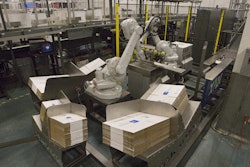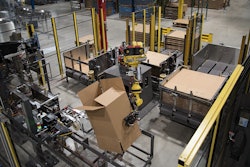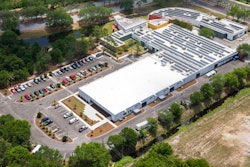
Atria Scandinavia is one of Northern Europe’s leading manufacturers of vegetarian and gourmet products for convenience markets and retail chains in need of round-the-clock service. Each day, packages of shrimp, olives, artichoke hearts, sun-dried tomatoes, garlic, and other specialties are labeled, packed in cartons, and palletized at the company’s four factories.
At one of Atria’s plants, in Skene in western Sweden, many of the plant’s 30 employees are now working side by side with collaborative robots from Universal Robots. The three “cobots”—two UR5 5-kg-payload robots, and one UR10 10-kg-payload robot—were installed to minimize labor and downtime, and increase packaging line efficiency.
Says Johnny Jansson, Atria’s Technical Manager, “Our goal is to get reliable product lines where we can produce efficiently and effectively while keeping our staffing costs down. As a food producer, it is extremely important for us to minimize downtime, so we can supply fresh goods at a competitive price.”
With Atria’s larger automated equipment, if a malfunction occurs, it can cause several hours of downtime and may require an outside specialist to fix. In considering the addition of cobots, Atria was looking for equipment that would provide minimal downtime, with operators able to solve whatever problem might arise.
According to UR, its robots can be used to automate “virtually anything” and feature patented technology that enables operators with no programming experience to easily set them up using 3D visualization. The six-axis industrial cobot arms are designed to handle repetitive processes and can work alongside operators without safety guarding.
Atria purchased the three robots from a local UR distributor, Edström’s, which offered the company training in the use of the robots. At the Atria factory, Jansson and his co-workers installed and implemented the technology within just two months. “We were completely new to it,” he says. “I didn’t know anything about robots the first time I saw them. My colleagues were not familiar with the technology either. So, I’m actually impressed that we did it as quickly as we did. The UR robots are very different from other brands, as they are very logical and intuitive to work with.”
The two UR5 cobots are now being used for processes such as labeling and folding cartons, while the UR10 is used to palletize cases. With the addition of the cobots, each production line is capable of preparing on average 228 items/hr for delivery. The easy programming and operation of the cobots has saved the company a significant amount of time when changing over from, for example, packaging for shrimp to packaging for olives. In fact, before installing the cobots, it took Atria six hours to convert to a different product; with the UR robots, changeover takes just 20 minutes.
Another advantage is the ability the cobots give Atria to develop new applications. In the plant’s workshop, Jansson and his colleagues have designed and built robot applications for a new, automated packaging process. "It simplifies the deployment of robots when we can build solutions for our production in-house,” he says. “We can go back and forth between the workshop and the production line refining applications as we build them. For example, we developed a small wheel to fold the edges of the cardboard boxes that the food products are packaged in. This solution probably wouldn’t have been conceived if we had been sitting in front of a computer planning the robot application.”
Through the use of the cobots, Atria has also optimized material use in its packaging department, reducing carton waste by 25%. The payback time for the investment was just 12 months.
Following the success of the project, management at Atria has decided to replace a traditional, shielded industrial robot and a bulky packaging machine that occupied half the space on the packaging floor with cobots. Says Jansson, “We actually want to get rid of all our carton machines and use only robots on each line to achieve much more reliable and flexible production.”























